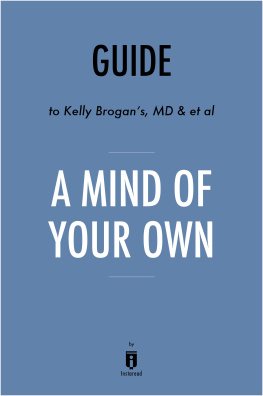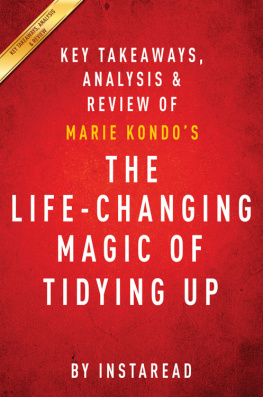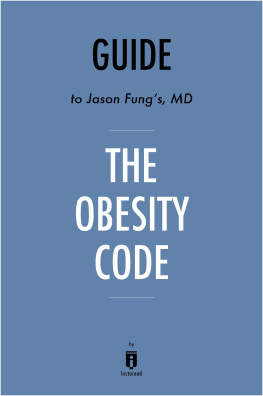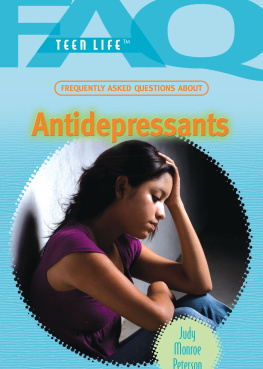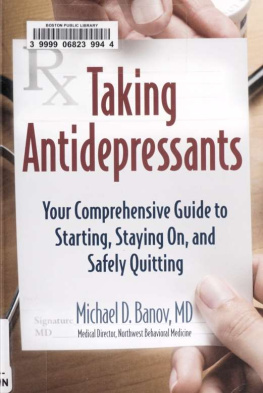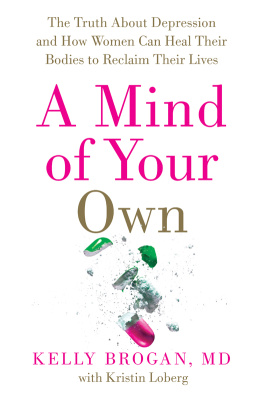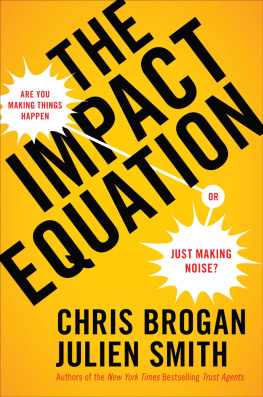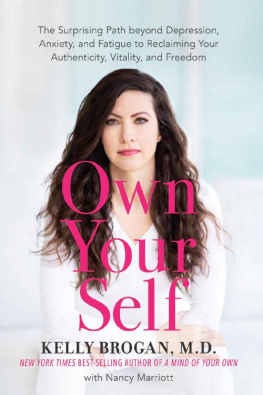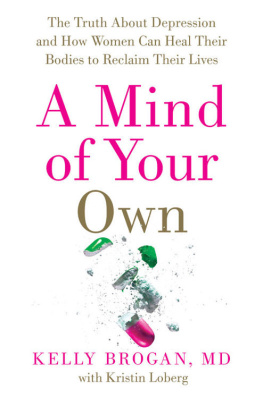Guide to
Kelly Brogans, MD & et al
A Mind of Your Own
The Truth About Depression and How Women Can Heal Their Bodies to Reclaim Their Lives
by
Instaread
Please Note
This is a companion to the original book.
Copyright 2016 by Instaread. All rights reserved worldwide. No part of this publication may be reproduced or transmitted in any form without the prior written consent of the publisher.
Limit of Liability/Disclaimer of Warranty: The publisher and author make no representations or warranties with respect to the accuracy or completeness of these contents and disclaim all warranties such as warranties of fitness for a particular purpose. The author or publisher is not liable for any damages whatsoever. The fact that an individual or organization is referred to in this document as a citation or source of information does not imply that the author or publisher endorses the information that the individual or organization provided. This concise companion is unofficial and is not authorized, approved, licensed, or endorsed by the original books author or publisher.
Table of Contents
Overview
A Mind of Your Own, by holistic womens health psychiatrist Kelly Brogan, aims to help women better understand the root causes of depression and the pervasive myths surrounding antidepressants. Brogan encourages readers to take their health and well being into their own hands. She outlines a four-week protocol of dietary restrictions, adjustments to sleep and exercise, and meditation. This regimen is intended to provide women with a healthier alternative to antidepressants. By taking an empowered, proactive approach to health, women can overcome debilitating symptoms, become healthier, and ultimately thrive without antidepressants.
Over the course of years as a traditional psychiatrist, Brogan prescribed antidepressants to women because she believed that a chemical imbalance in the brain accounted for mental health disorders. A health crisis of her own forced Brogan to reconsider the conventional wisdom surrounding pharmaceutical treatments for common ailments. After being diagnosed with Hashimotos thyroiditis, an autoimmune disease, shortly after giving birth to her first child, Brogan began researching her illness. She discovered that her condition often went undiagnosed as the cause of depression.
To treat her condition without medication, Brogan investigated alternative means of healing. With the help of a naturopathic doctor, she learned that her thyroid dysfunction was caused by a combination of postpartum bodily changes, an imbalance in her gut, and poor dietary choices. Brogan took her newfound knowledge and passion and applied it to patients suffering from depression with astoundingly positive results.
Aggressive marketing from pharmaceutical companies has helped perpetuate a myth that depression, anxiety, and other mental health disorders are attributable to a chemical imbalance. However, no study has ever actually proven this theory. Pharmaceutical companies have much to gain monetarily from this unsubstantiated claim. They have manipulated and even suppressed studies that suggest that the causes of depression and related symptoms of inflammation are not adequately treated by antidepressants. As a result, doctors overlook the undeniable link between gut health and brain health.
The key to mental and physical health is allowing the body to heal naturally by addressing inflammation, which is a major cause of many illnesses including depression. Instead of blindly buying into the notion that pills will be an overnight cure, women can trust their own bodies and their bodies innate healing wisdom.
Important People
Kelly Brogan is a psychiatrist who specializes in womens mental health. She is the co-author of Integrative Therapies for Depression (2015).
Kristin Loberg is a writer and has co-authored several New York Times bestsellers, including Grain Brain (2013) with David Perlmutter and The End of Illness (2012) with David Agus.
Key Insights
- Depression is not the result of a serotonin deficiency. Depression is a signal that the body is adapting to a stressor.
- Pharmaceutical companies have shamelessly suppressed and manipulated data about the efficacy of antidepressants.
- Other medications, not just antidepressants, can trigger symptoms of depression.
- Overreliance on medication can actually harm the bodys natural ability to restore balance and health.
- Learning about the interconnectedness of the bodily systems can help you support optimal immune functioning, inducing more vibrant health than prescription drugs can.
- The link between gut health and brain health is vital to overall well being.
- Inflammation is the primary cause of depression and other chronic diseases including cancer.
- The most important step in recovering a natural state of health is making major dietary shifts, which will have a beneficial effect on the microbiome in as little as 72 hours.
- The dietary protocol for taking charge of mental health requires eliminating gluten, dairy, and sugar.
- A genetic predisposition to illness, including symptoms of depression, doesnt have to determine health. Addressing environmental factors can profoundly improve well being regardless of genetic makeup.
- In addition to taking supplements and embracing an anti-inflammatory diet, prioritize regular exercise and meditation, making them lifelong habits.
Analysis
Key Insight 1
Depression is not the result of a serotonin deficiency. Depression is a signal that the body is adapting to a stressor.
Analysis
Pharmaceutical companies spent $4.53 billion in advertising in 2014. They claim that depression is due to an imbalance in the brain of serotonin, a neurotransmitter, and present antidepressants as the antidote to depression. Yet depression has never been proven to be the result of a neurological chemical imbalance. Instead, it is the result of the bodys interrelated systems attempting to adapt to stressors, such as inflammation.
The notion that depression is an illness of the mind, as Andrew Solomon writes in The Noonday Demon: An Atlas of Depression, is a pervasive one. [1] Adding to this confusion, cultural myths about depression have dramatized and obscured its causes. From a medical perspective, the romantic association of depression with creativity is particularly distracting. Writers throughout history have documented its ravaging effects on their lives, including twentieth-century women writers, such as Virginia Woolf, Sylvia Plath, Anne Sexton, and Alejandra Pizarnik, who all committed suicide. Although readers may find solace in reading about the experiences of others who share their symptoms, the cultural trope of the tortured artist does nothing to illuminate the causes of depression: distressed body systems.
The symptoms of depression, including foggy mind and profound sadness, can often be so encompassing that its difficult for those experiencing it to think about anything else beyond their own malaise and suffering, let alone consider and evaluate its potential causes. Moreover, a social stigma still adheres to mental health disorders as if they reflect the personal failings of the people suffering from them. This stigma contributes to a culture of shame in which individuals who suffer from depression do not question the doctors prescribing the medication because they are desperate for a quick and relatively private fix.
Key Insight 2
Pharmaceutical companies have shamelessly suppressed and manipulated data about the efficacy of antidepressants.
Analysis
The pharmaceutical industry sponsors 70 percent of the studies conducted on antidepressants. Pharmaceutical companies are heavily invested in suppressing any evidence that antidepressants do not improve patients lives. In fact, medication can often lead to a worsening of symptoms over time and rarely facilitates true healing. Many studies have shown that antidepressants are no more effective than a placebo.
Next page
